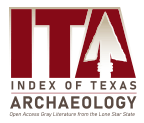Home > Research Projects and Centers > Center for Regional Heritage Research > Index of Texas Archaeology > Vol.
Agency
Texas Historical Commission
Abstract
On October 21, 2019, in response to a request from the City of San Antonio (COSA) Transportation and Capital Improvements (TCI), The University of Texas at San Antonio (UTSA) Center for Archaeological Research (CAR) conducted archaeological monitoring of geotechnical boring associated with the Cenotaph Relocation project in the Alamo Plaza complex in San Antonio, Bexar County, Texas. The boring samples will be used by Terracon Consultants, Inc. (Terracon) to evaluate the soil bearing pressure, the active soil load, the location of the groundwater table, and the soil characteristics. The archaeological work consisted of monitoring two geotechnical bores that formed the Area of Potential Effect (APE), which covered less than 0.004 hectare (0.01 acre).
The APE is located within the Alamo Plaza Historic District. The district includes Alamo Plaza, located immediately west of the Alamo (41BX6), a site that originally functioned as the third and final location of Mission San Antonio de Valero. Site 41BX6 is a State Antiquities Landmark (SAL), listed on the National Register of Historic Places, and designated a UNESCO World Heritage Site. As a public municipal property, undertakings that might affect archaeological or historical sites are subject to regulatory review. At the municipal level, the property falls under COSA’s Unified Development Code (Article 6 35-630 to 35-634). The project also requires review by the Texas Historical Commission (THC), under the Antiquities Code of Texas, and it was assigned Texas Antiquities Permit No. 9098. Cynthia Munoz served as Principal Investigator, and José E. Zapata served as the Project Archaeologist.
CAR monitoring activities did not locate any cultural material or features. However, the 7.6 cm (3 in.) diameter bores greatly restricted this assessment. Consequently, CAR recommends that any future ground disturbance plans in Alamo Plaza include archaeological monitoring and/or testing. The THC concurs with CAR’s recommendation that any additional ground disturbances in this area should undergo archeological investigation. All project related material, including the final report, are permanently stored at the CAR facilities in accession file number 2235. Terracon submitted a separate geotechnical report to TCI.
Creative Commons License

This work is licensed under a Creative Commons Attribution-NonCommercial 4.0 International License
Included in
American Material Culture Commons, Archaeological Anthropology Commons, Environmental Studies Commons, Other American Studies Commons, Other Arts and Humanities Commons, Other History of Art, Architecture, and Archaeology Commons, United States History Commons
Submission Location
Tell us how this article helped you.


